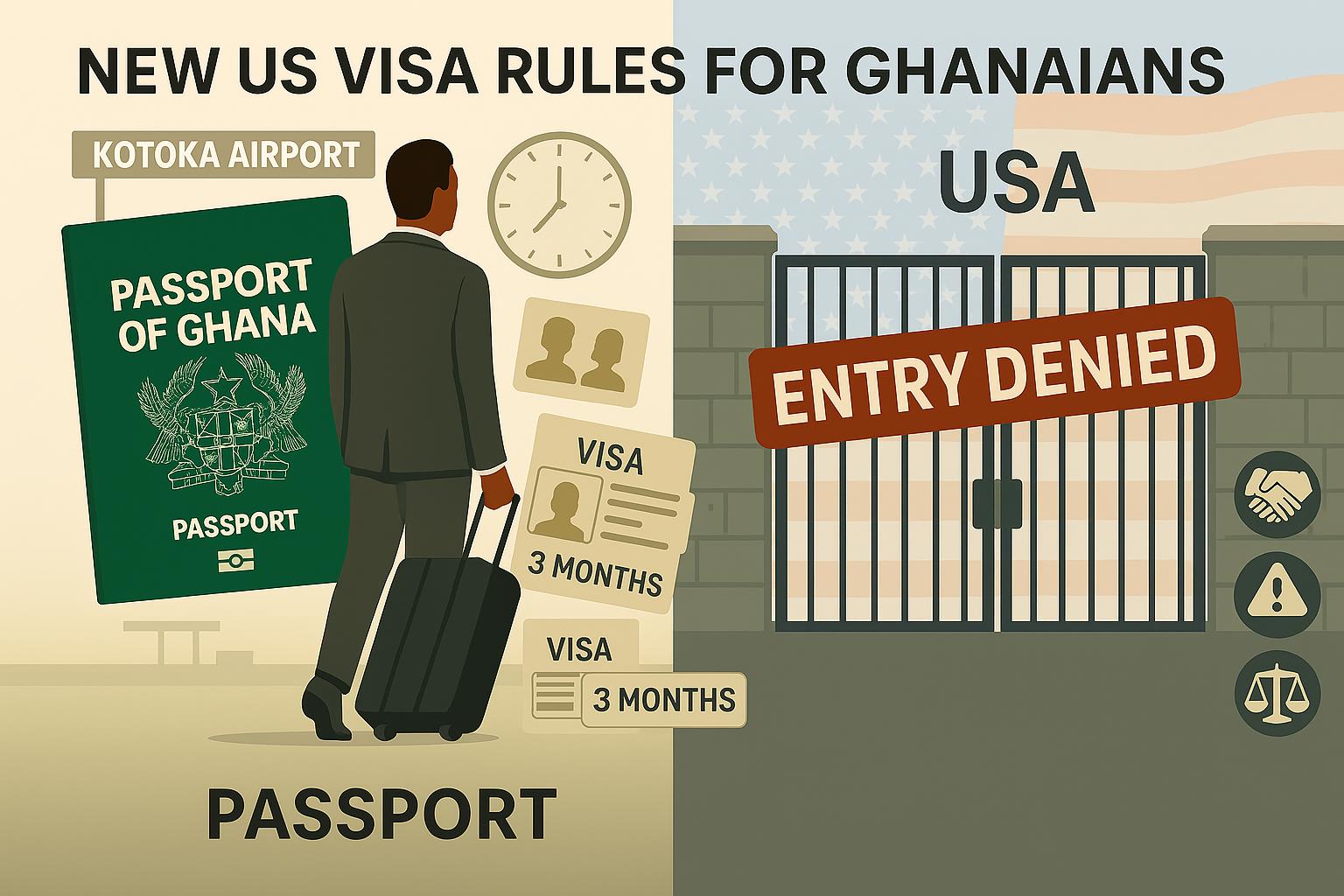US Visa Restrictions on Ghanaians: A Diplomatic Crossroads and National Wake-Up Call

In a sweeping policy shift that has stirred diplomatic ripples across West Africa, the United States government has revised its visa reciprocity schedule for Ghana, drastically reducing the validity and entry privileges of most non-immigrant visas. Effective July 8, 2025, Ghanaian applicants for categories such as B1/B2 (business/tourism) and F-1 (student) visas will now receive single-entry permits valid for just three months, a stark departure from the previous five-year, multiple-entry standard.
🛂 What Has Changed?
Under the updated guidelines from the US Department of State, Bureau of Consular Affairs, the following changes apply:
-
B1/B2 Visas: Reduced from five-year multiple-entry to three-month single-entry.
-
F-1 Student Visas: Also limited to a three-month single-entry, complicating academic travel and re-entry during school breaks.
-
K1/K2 Visas: For fiancés and their children, remain single-entry valid for six months.
-
K3/K4 Visas: For spouses and dependents of US citizens, retain multiple-entry status valid for 24 months.
-
A-Class Diplomatic Visas: Unaffected, still valid for 24–60 months with multiple entries.
The policy applies only to new visa issuances. Existing visas remain valid under their original terms.
🇺🇸 US Justification: Reciprocity and Security
According to US Embassy Chargé d’Affaires Rolf Olson, the change is part of a global immigration recalibration aimed at improving fraud detection and national security. Olson emphasized that the decision was not punitive but based on reciprocity: “We believe it is easier to detect and prevent fraud when we have shorter visa validities”.
He also clarified a common misconception: the three-month validity refers to the window to enter the US, not the duration of stay. Once admitted, travellers may still be granted up to six months by Customs and Border Protection (CBP) officers.
📉 The Overstay Factor
A key trigger for the policy revision was Ghana’s 21% visa overstay rate, particularly among students, exceeding the US benchmark of 15%2. This statistic has raised concerns in Washington about compliance and enforcement, prompting tighter controls.
🇬🇭 Ghana’s Response: Diplomatic Engagement and Data Defence
The Ministry of Foreign Affairs, led by Samuel Okudzeto Ablakwa, has expressed strong concern over the new restrictions, calling them a “substantial variance” from prior reciprocal arrangements.
In a press release dated July 11, 2025, the Ministry revealed that Ghana issued 40,648 visas to US citizens between January and July, 70.42% of which were multiple-entry, including five-year permits. Ghana maintains that its visa policy has been generous and consistent with bilateral commitments.
Ablakwa recently led a high-level delegation to Washington, where discussions reportedly yielded “positive outcomes” and a roadmap for future negotiations.
💬 Public Reaction and Political Commentary
The policy has sparked debate in Ghana’s political and media circles. Presidential staffer Bridget Otoo controversially blamed Ghanaian students for the restrictions, citing the overstay rate. Critics, however, argue that the government’s diplomatic posture and public statements may have contributed to the breakdown in reciprocity.
Meanwhile, Minister Felix Kwakye Ofosu suggested the restrictions may be temporary, pending Ghana’s efforts to reduce overstays.
🎓 Impact on Students, Tourists, and Business Travellers
The new rules pose significant challenges:
-
Students may struggle to return home during holidays or emergencies without reapplying for a visa.
-
Tourists and Business travellers must now plan single-entry trips, increasing costs and administrative burdens.
-
Frequent Flyers face logistical hurdles, with each trip requiring a fresh application and fee.
🔍 Looking Ahead: A Test of Reciprocity and Reform
While the US maintains that visa reciprocity is a standard diplomatic practice, Ghana’s government is pushing for a swift resolution. The Foreign Ministry has pledged to educate applicants, strengthen compliance, and enhance passport security, including the rollout of chip-embedded biometric passports.
As both nations navigate this diplomatic crossroads, the outcome may hinge on Ghana’s ability to demonstrate reform and negotiate parity in future visa arrangements.



0 Comments
No comments yet, be the first to comment